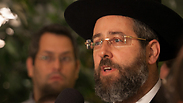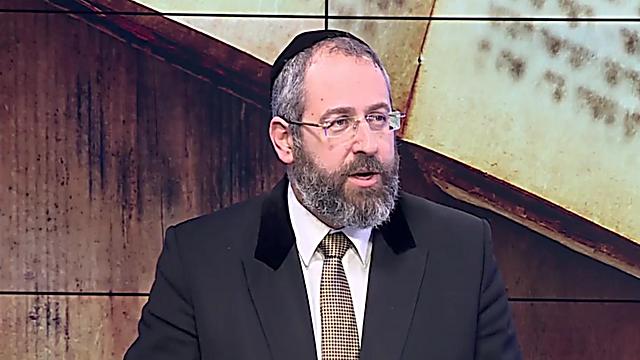
Chief Rabbi David Lau
צילום: אוהד צויגנברג
Seeking forgiveness, on behalf of Israel's rabbis
Op-ed: Israel's Ashkenazi Chief Rabbi David Lau writes about Yom Kippur and the need to preserve Israel's Jewish nature—for the generations to come.
It is the eve of Yom Kippur, and it is time for repentance.
This is the time of year in which we should all examine our own actions and see what we've done wrong in the past year and how we could've acted differently. This is done, of course, with the aspiration to rectify things in the coming year.
Each and every one of us should examine our behavior primarily towards those around us: Whether we were attentive, caring and respectful towards one another.
With that in mind, I would also like to express my feelings on the public level. I too feel the need to ask for forgiveness from the public, as one who is standing at the helm of a wide-scale system of thousands of rabbis and prayer leaders who do a holy work—preserving Judaism in the Land of Israel.
I ache and regret the fact that a significant part of the Jewish people in Israel feels that the religious and observant public in the country are trying to impose lifestyles in different areas of life, while no one bothers explaining why.
You must understand. There is no area in our lives that law hasn't touched upon and set boundaries, impositions. We must not drive on Israel's roads at whatever speed we so desire, and we must wear a seatbelt. These are examples of two out of hundreds of imposed laws that were put in place for the benefit of the individual citizen, the general population, and public order.
In matters of Judaism, there is no law that forces one to observe the rules of the faith or to lead one lifestyle or another, and each is allowed by law to live his life based on his beliefs and views. However, as a Jewish state, we must work to maintain its Jewish nature as the country's founders envisioned throughout the generations. To that end, there are some fields of life in which legislation makes many citizens act differently to what they want—in marriage, divorce, conversions, etc.
The late president Shimon Peres, may he rest in peace, used to tell of his last memory of his grandfather, who was murdered in the Holocaust, and of his will to his grandson that he must never forget his Jewish origins. And so Peres fought—regardless of his own beliefs—to preserve the state's democratic nature but also its Jewish one.
As members of the Jewish nation, we have an obligation towards future generations as well to ensure that our children and grandchildren remember what is the meaning of Jewish heritage and tradition, even if they choose to live their personal lives their own way. And even if parts of our people don't observe Israel's Torah or its teachings, we are all on the same big boat carrying the Jewish people across the generations, and we must protect the structure of this boat so it may reach its destination.
Despite the difficulties in maintaining the status quo on issues of religion and state, which was set back in David Ben-Gurion's time, it's important to us—to all us, even those who disagree—to preserve it.
It is not for us that we seek to do this, but for our children and grandchildren, so they may remember what Judaism is, what tradition is, what Israel's holidays are. That they may never forget the Torah. G'mar Chatima Tovah to all of Israel.
Rabbi David Lau is the Ashkenazi Chief Rabbi of Israel.











